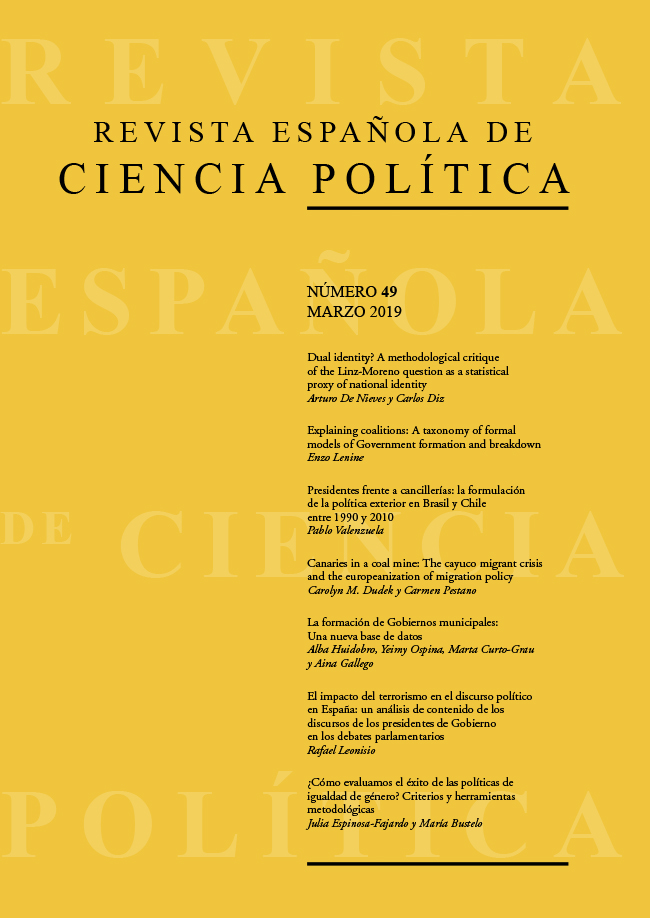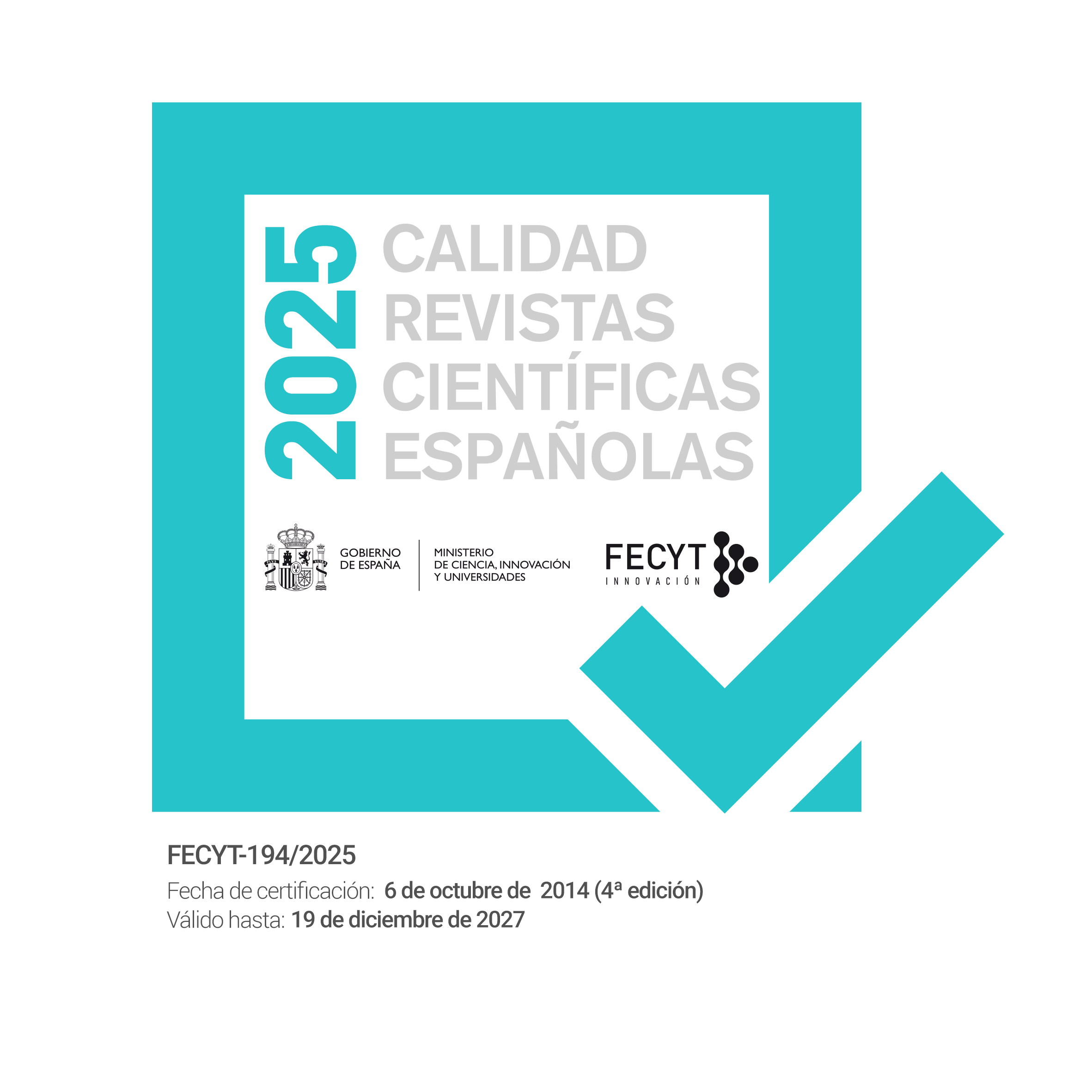Canarios en una mina: la crisis migratoria de los cayucos y la europeización de la política migratoria
DOI:
https://doi.org/10.21308/recp.49.04Palabras clave:
Política migratoria, gobernanza blanda, europeización, España, Islas Canarias.Resumen
Entender cómo el Estado español y las Islas Canarias lidiaron con la crisis de los cayucos y sus consecuencias es esencial para comprender la actual crisis migratoria a la que se enfrenta Europa. Empleando las lentes teóricas del intergubernamentalismo liberal y el neoinstitucionalismo, este artículo estudia cómo la UE ha configurado la gobernanza de la política migratoria utilizando gobernanza dura y blanda. Gobernanza dura se refiere a los mecanismos coercitivos legalmente impuestos, mientras que la gobernanza blanda puede ser la cooperación o la adopción voluntaria de modelos de la UE. Durante la crisis del cayuco, cuando miles de inmigrantes irregulares africanos llegaron a las Islas Canarias, el Gobierno español buscó el apoyo de los Estados miembro a través de Frontex y adoptó la externalización de la política de migración de la UE con el Plan África, un paquete de ayuda para detener la inmigración en su lugar de origen. Tanto Frontex como el Plan África fueron modelos políticos de la UE, lo que demuestra la gobernanza blanda de la UE y la europeización de la política migratoria. Como resultado, España logró su objetivo de detener el flujo de inmigrantes irregulares, pero el Estado siguió siendo el principal actor en la política migratoria, tal y como afirman los autores intergubernamentales liberales. Sin embargo, las políticas inspiradas en la UE que finalmente adoptó España durante la crisis del cayuco se han emulado en la actual crisis migratoria, inspirando un modelo para las políticas migratorias presentes y futuras en Europa.Descargas
Citas
Alcalde, Ana. 2007. “The Spanish Action Plan for Africa”. Review of African Political Economy, 34 (111): 194-198.
Amnesty International. 2006. «Los derechos de los extranjeros que llegan a las Islas Canarias siguen siendo vulnerados», en Resultado de la misión de investigación de Amnistía Internacional. London: Amnesty International.
Asín Cabrera, María. 2007. «Menores extranjeros: artículo 92: menores extranjeros no acompañados. Artículo 93: desplazamiento temporal de menores extranjeros. Artículo 94: residencia del hijo de residente legal», en Margarita Isabel Ramos Quintana y Gloria Pilar Rojas Rivero (coords.), Comentarios al Reglamento de extranjería. Madrid: Lex Nova.
Bach, Tobias., Eva Ruffing and Kutsal Yesilkagit. 2015. “The Differential Empowering Effects of Europeanization on the Autonomy of National Agencies”, Governance, 28: 285-304. Available at: https://doi.org/10.1111/gove.12087.
Bevir, Mark. 2008. “What is Governance? Key Concepts in Governance”. Los Angeles: Sage.
Buonanno, Laurie. 2017. “The European Migration Crisis”, in Dinan, D., Nugent, N., Paterson, W. E. (eds.), The European Union in Crisis. London: Palgrave.
Carrera, Sergio, Jennifer Allsopp. 2018. “The Irregular Immigration Policy Conundrum: Problematizing “effectiveness” as a frame for EU criminalization and expulsion policies”, in Ripoll Servent, A., Trauner, F. (eds.), The Routledge Handbook of Justice and Home Affairs Research. New York: Routledge.
Castellano, Nicolás. 2016. “20 años de inmigración en Canarias”, Cadena Ser. Available at: http://cadenaser.com/especiales/seccion/espana/2014/inmigracion-canarias/.
Caviedes, Alexander. 2017. “European Immigration and Asylum Policy”, in The Routledge Handbook of European Public Policy. New York: Routledge.
Cornelisse, Galina. 2014. “What’s wrong with Schengen? Border Disputes and the Nature of Integration in the Area without Internal Borders”, Common Market Law Review, 51 (3): 741-70.
Council of the European Union. 2004. Council Regulation (EC) No 2007/2004 establishing a European Agency for the Management of Operational Cooperation at the External Borders of the Member States of the European Union. Available at: https://bit.ly/2TaslrS.
Dehousse, Renaud. 2016. “Has the European Union moved towards soft governance?”, Comparative European Politics, 14: 20-35. Available at: https://doi.org/10.1057/cep.2015.7.
European Commission. 2010. “Schengen: some basic facts”. Press Releases. Available at: https://bit.ly/2C4cLn3.
European Commission. 2016. “EU Regional Trust Fund in Response to the Syrian Crisis - European Neighbourhood Policy and Enlargement Negotiations: EU Regional Trust Fund in Response to the Syrian Crisis”, European Neighbourhood Policy and Enlargement Negotiations. Available at: https://bit.ly/2kCJgin.
European Commission. 2017. “The EU Emergency Trust Fund for Africa-International Cooperation and Development”, International Cooperation and Development. Available at: https://bit.ly/1NwTlU6.
European Parliament. 1999. Tampere European Council 15-16.10.1999: Conclusions of the Presidency”. Available at: https://bit.ly/2H9vAZu.
European Parliament Think Tank. 2017. EU accession to the European Convention on Human Rights (ECHR). Available at: https://bit.ly/2Jexp5n.
Finotelli, Claudia and Irene Ponzo. 2017. “Integration in times of economic decline. Migrant inclusion in Southern European societies: trends and theoretical implications”, Journal of Ethnic Migration Studies. 44 (14), 2303-2319. Available at: https://doi.org/10.1080/1369183X.2017.1345830.
Finotelli, Claudia. 2018. “Southern Europe: Twenty-five years of immigration control on the waterfront”, in A. Ripoll Servent and F. Trauner (eds.), The Routledge Handbook of Justice and Home Affairs. New York: Routledge.
Frontex. 2006. “Longest FRONTEX coordinated operation. HERA, the Canary Islands”, News. Available at: https://bit.ly/2tMXTVv.
Frontex. 2015. Press Pack on the General Migratory Situation at the External Borders of the EU. Available at: https://bit.ly/2Uhsxlw.
Frontex. 2017. National Authorities. Available at: https://bit.ly/2VwmUAe.
Frontex. 2018. Origin and Tasks. Available at: https://bit.ly/2HbsJPE.
Global Detention Project. 2016. Spain: Immigration Detention Profile. Available at: https://bit.ly/2gkrHDo.
Godenau, Dirk and Ana López Sala. 2016. “Non-State Actors and Migration Control in Spain. A Migration Industry Perspective”. The Futures we want: Global Sociology and the Struggles for a Better World. 3rd ISA Forum of Sociology, July 10-14, Vienna, Austria, 2016. Available at: http://hdl.handle.net/10261/136847.
Gourevitch, Peter. 1978. “The Second Image Reversed: The International Sources of Domestic Politics”, International Organization, 32: 881-912. Available at: https://doi.org/10.1017/S002081830003201X.
Graziano, Paolo and Charlotte Halpern. 2016. “EU governance in times of crisis: Inclusiveness and effectiveness beyond the “hard” and “soft” law divide”, Comparative European Politics, 14: 1-19. Available at: https://doi.org/10.1057/cep.2015.6.
Green Cowles, Maria, James Caporaso and Thomas Risse. 2001. Transforming Europe, Europeanization and Domestic Change. Ithaca: Cornell University Press.
Guiraudon, Virginie. 2000. “European Integration and Migration Policy: Vertical Policy-making as Venue Shopping”, Journal of Common Market Studies, 38: 251-271. Available at: https://doi.org/10.1111/1468-5965.00219.
Guiraudon, Virginie. 2018. “The 2015 refugee crisis was not a turning point: explaining policy inertia in EU border control”, European Political Science, 17: 151-160. Available at: https://doi.org/10.1057/s41304-017-0123-x.
Hooghe, Liesbet and Gary Marks. 2001. Multi-level Governance and European Integration. Lanham, MD: Rowman and Littlefield.
Majone, Giandomenico. 1999. “The regulatory state and its legitimacy problems”, West European Politics, 22: 1-24. Available at: https://doi.org/10.1080/014023 89908425284.
Marks, Gary. 1993. “Structural Policy and Multilevel Governance in the EC”, in Alan Cafrun and Glenda Rosenthal (eds.), The State of the European Community: The Maastricht Debates and Beyond. Boulder: Lynne Rienner Publishers.
Menz, Georg. 2010. “Stopping, Shaping and Moulding Europe: Two Level Games, Non-State Actors and the Europeanization of Migration Policies”, Journal of Common Market Studies, 49: 437-462. Available at: https://doi.org/10.1111/j.1468-5965.2010.02123.x.
Ministerio del Interior. 2016. Inmigración Irregular: balance 2015. Lucha contra la inmigración irregular. Available at: https://bit.ly/2tRJZmH.
Monar, Jörg. 2007. “Justice and Home Affairs”, Journal of Common Market Studies, 45: 107-124. Available at: https://doi.org/10.1111/j.1468-5965.2007.00738.x.
Moravcsik, Andrew. 1994. “Why the European Community Strengthtens the State: Domestic Politics and International Cooperation”, Annual Meeting of the American Political Science Association. New York. Available at: https://doi.org/10.1177/1465116501002002004.
Moravcsik, Andrew. 2001. “A constructivist research programme for EU studies”, European Union Politics, 2: 219-249.
Mungianu, Roberta. 2013. “Frontex: Towards a Common Policy on External Border Control”, European Journal of Migration and Law, 15: 359-385. Available at: https://doi.org/10.1163/15718166-00002041.
Peters, B. Guy. 2002. Governance: A Garbage Can Perspective. Political Science Series Vienna: Institute for Advanced Studies. Available at: https://bit.ly/2EHfrJ9.
Pierre, Jon and B. Guy Peters. 2005. “Multilevel Governance: A Faustian Bargain?”, in Governing Complex Societies: Trajectories and Scenarios. London: Palgrave Macmilan. Available at: https://doi.org/10.1057/9780230512641_5.
Radaelli, Claudio. 2000. “Whither Europeanization: Concept Stretching and Substantive Change”, European Integration On-line Papers, 4 (8).
Ripoll Servent, Ariadna and Floriant Trauner (eds.). 2018. The Routledge Handbook of Justice and Home Affairs Research. New York: Routledge.
Rosenow, Kerstin. 2009. “The Europeanization of Integration Policy”, International Migration, 47: 131-159. Available at: https://doi.org/10.1111/j.1468-2435.2008.00499.x.
Schain, Martin. 2009. “The State Strikes Back: Immigration Policy in the European Union”, The European Journal of International Law, 20: 93109. Available at: https://doi.org/10.1093/ejil/chp001.
Schmitter, Philippe C. 1970. “A Revised Theory of Regional Integration”, International Organization, 24: 836-868. Available at: https://doi.org/10.1017/S0020818300017549.
Smith, Andy. 2003. “Multi-Level Governance: What it is and How it Can Be Studied”, in Handbook of Public Administration. London: SAGE. Available at: https://doi.org/10.4135/9781848608214
Tommel, Ingebörg and Amy Verdun. 2013. “Innovative Governance in EU Regional and Monetary Policy-Making”, German Law Journal, 14: 380-404.
Tosun, Jale, Anna Wetzel and Galina Zapryanova. 2014. “The EU in Crisis: Advancing the Debate”, Journal of European Integration, 36: 195-211. Available at: https://doi.org/10.1080/07036337.2014.886401.
Triandafyllidou, Anna. 2014. “Multi-leveling and externalizing migration and asylum: lessons from the southern European islands”, Island Studies Journal, 6: 7-22.
Van Kersbergen, Kees and Francis van Waarden. 2004. “Governance” as a Bridge between Disciplines. Cross-Disciplinary Inspiration regarding Shifts in Governance and Problems of Governability, Accountability, and Legitimacy”, European Journal of Political Research, 43 (2): 143-171. Available at: https://doi.org/10.1111/j.1475-6765.2004.00149.x.
Publicado
Cómo citar
Número
Sección
Licencia
Derechos de autor 2019 Carolyn M. Dudek; Carmen Pestano

Esta obra está bajo una licencia internacional Creative Commons Atribución-NoComercial-SinDerivadas 4.0.






